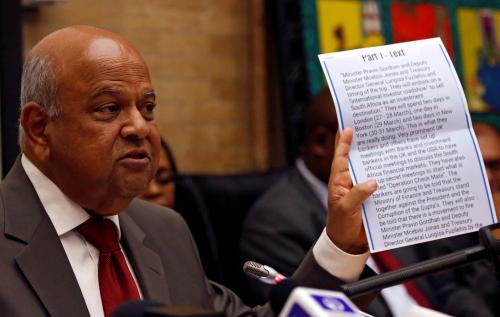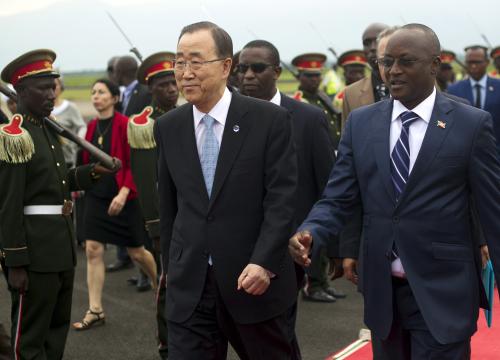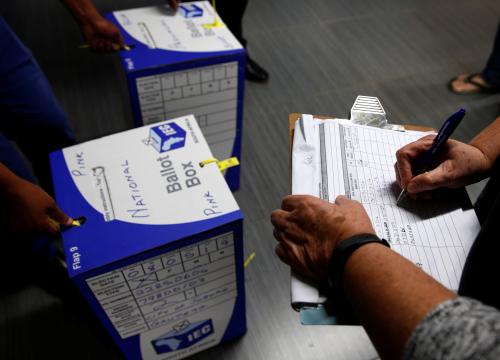South African court rules President Zuma violated the constitution
Thursday, South Africa’s highest court found President Zuma guilty of violating the constitution as he refused to reimburse the large sum of money spent on improvements to his personal home. Between 2010 and 2014, the home located in the president’s rural hometown of Nkandla received improvement which cost an estimated $23 million. The improvements include a chicken coop, an amphitheater, a swimming pool, and a helipad. President Zuma has stated that the improvements were necessary to ensure his security and should consequently be paid for with taxpayers’ money. In 2014, public prosecutor Thuli Madonsela ruled that the president should repay part of the taxpayers’ money spent on the improvements of his personal home. In refusing to do so, he violated the country’s constitution “by not complying with a decision by the public protector, the national watchdog.” The court has given the National Treasury 60 days to determine the sum the president must repay. The opposition has stated that they will seek Zuma’s impeachment.
In other South African news, this week, the rand strengthen against the U.S. dollar and reached its highest value since December 8, 2015, the day before President Zuma fired former Finance Minister Nhlanla Nene. The strengthening of the rand was coupled with the strengthening of other Emerging Markets currencies. This hike follows the statement from Federal Reserve Chair Janey Yellen, reiterating the importance to raise U.S. interest rates cautiously, amid risks in the global economy. Investors—weighting prospects of higher U.S. borrowing costs—were holding off in acquiring emerging-market assets.
Seventeen Angolan activists are sentenced to jail time
This week, 17 Angolan activists were sentenced to jail time for rebellion against the government of Jose Eduardo dos Santos. The sentences ranged from two years to eight and a half years. Last June, the activists were arrested during a book club meeting focusing on Gene Sharp’s book titled From Dictatorship to Democracy: A Conceptual Framework for Liberation—a book on nonviolence and resistance to repressive regimes. Monday, the activists were charged and sentenced with acts of rebellion, planning mass action of civil disobedience, and producing fake passports, among other charges. Amnesty International has accused the Angolan court of wrongfully convicting the activists and using the judicial system to “silence dissenting views.”
Later in the week, in response to the jailing of the young activists, the Portuguese branch of hacking group Anonymous claimed the shutdown of 20 government websites, including that of the Ministry of Education and the Ministry of Labor and Social Security, among others. In a Facebook post claiming the attack, the group states, “The real criminals are outside, defended by the capitalist system that increasingly spreads in the minds of the weak.” The functionality of the websites has been restored.
Aid cuts due to disputed election rerun hit Tanzania
On Monday, March 28, the U.S. Millennium Challenge Corporation (MCC) withdrew $472 million in aid from the government of Tanzania after the result of the last weekend’s disputed presidential election rerun in the semi-autonomous archipelago of Zanzibar was announced. Incumbent President Ali Mohamed Shein of the ruling Chama Cha Mapinduzi party was declared the winner with 91.4 percent of the vote. However, the rerun was boycotted by the opposition Civic United Front party over the cancellation of last October’s election by the Zanzibar Electoral Commission. The commission claimed the October poll was fraudulent, while the opposition says the allegations of fraud were fabricated to thwart a victory by their candidate.
The MCC was planning a number of power and infrastructure projects in Tanzania, but its development assistance programming is conditional upon beneficiaries meeting certain standards of good governance. The MCC’s board of directors held a vote on Monday, in which they determined that Tanzania was no longer eligible to partner with the MCC given the election outcome. Although the loss of the MCC partnership is a sizable blow to the Tanzanian government, the Tanzanian finance minister appeared optimistic that the power projects would continue despite the MCC’s decision, as he stated: “We weren’t surprised at all because we were prepared for whatever the outcome. We will implement those projects using local sources of fund and the support of from other development partners.” Meanwhile, 10 out of the country’s 14 key western donors withdrew general budget support to Tanzania over the contested election.
The Brookings Institution is committed to quality, independence, and impact.
We are supported by a diverse array of funders. In line with our values and policies, each Brookings publication represents the sole views of its author(s).







Commentary
Africa in the News: Zuma violates South African constitution, Angola jails activists and Tanzania suffers aid cuts
April 1, 2016